Heat stress has emerged as an increasing concern for Germany. Since 1881, the number of days per year with a maximum temperature above 30°C has nearly tripled and a further increase of this trend driven by climate change is anticipated. … Read More
Blog
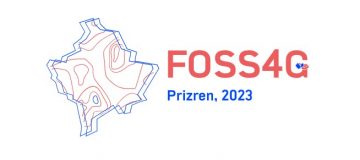
FOSS4G conference 2023
This years FOSS4G conference will take place from 26 June – 2 July 2023 in Prizren, Kosovo. And HeiGIT will participate again! Since 2006 FOSS4G, the largest global gathering for geospatial software, is organized by the Open Source Geospatial … Read More
Paper presentation at AGILE: “Exploring MapSwipe as a Crowdsourcing Tool for (Rapid) Damage Assessment: The Case of the 2021 Haiti Earthquake”
Under the main theme “Spatial data for design” the 26th AGILE conference will be held this week in Delft, Netherlands. Besides a variety of geo-spatial related themes, disaster mapping still plays a crucial role in GIScience. Simon Groß and Sven … Read More
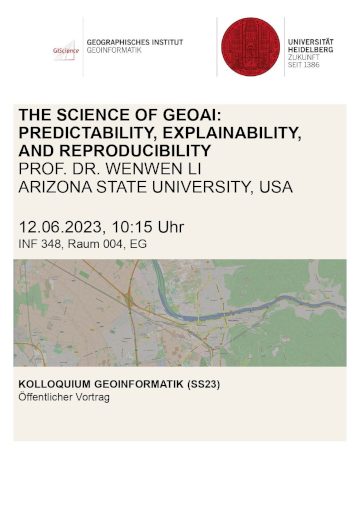
“Max-Kade Visiting Professorship” of Wenwen Li
Beginning May 20, 2023, Professor Wenwen Li from the Arizona State University (ASU) will teach at the Heidelberg University for two months. Professor Li received her PhD in Earth System and Geoinformation Science from the George Mason University in 2010 … Read More
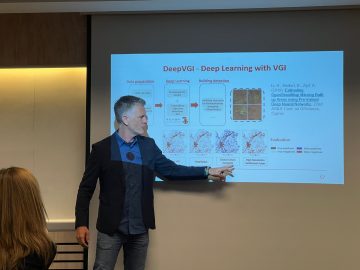
Guest lectures on Volunteered Geographic Information at UC Chile
In May 2023, Prof. Dr. Alexander Zipf visited the UC Chile (Pontificia Universidad de Catolica de Chile) and the Heidelberg Center for Latin America (HCLA) in Santiago (Chile) together with Anne Schauß, giving two open lectures that showcased past and … Read More
Participatory Mapping taken one step further – The new version of the Sketch Map Tool
Sketch Map Tool (SMT) – An easy-to-use way to create and digitalize paper maps for offline data collection in the field The HeiGIT (Heidelberg Institute for Geoinformation Technology) team recently launched a new version of the Sketch Map Tool – … Read More
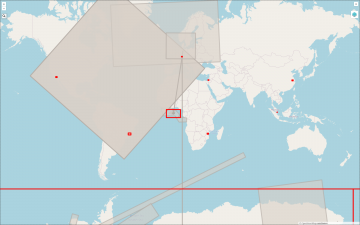
2022 #30DayMapChallenge Round-Up Part 2: Deleted Maps
Featured photo: The deleted map displays all deleted elements within the analyzed areas (red). Gray rectangles represent deleted buildings. This past November, our teams at HeiGIT and GIScience participated in Topi Tjukanov’s Twitter event #30DayMapChallenge, where mappers display their creativity … Read More
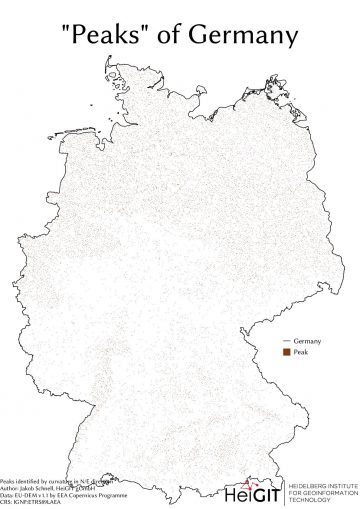
#30DayMapChallenge Round-Up Part 1: Germany Three Ways
Featured Image: The peaks of Germany identified by curvature in N/E direction, Jakob Schnell’s contribution for Day 7 (Raster) of the #30DayMapChallenge. This past November, our teams at HeiGIT and GIScience participated in Topi Tjukanov’s Twitter event #30DayMapChallenge, where mappers display … Read More
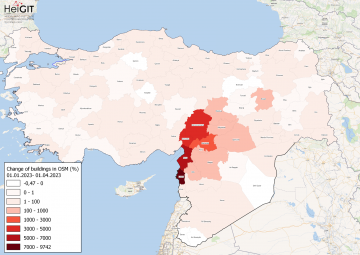
How to become ohsome part 15- Analysing Changes in OSM after the Earthquake in Syria and Türkiye in February 2023
Featured Map: Percent change in each province of Türkiye and Syria of buildings in OSM. Data from OpenStreetMap, visualized using QGIS and the ohsome API plugin. Welcome back to the how to become ohsome series! If you’re new to the series, … Read More
Training on digitalization of participatory mapping in Kuala Lumpur
Last week, HeiGIT team member Anne Schauß held a workshop session in Kuala Lumpur, Malaysia, during a training of the International Federation of Red Cross and Red Crescent Societies (IFRC). The international training focused on community resilience and how to … Read More
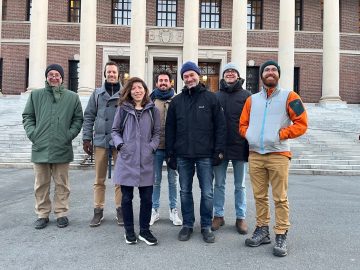
GeoEPI at CGA Conference: From Geospatial Research to Health Solutions
Featured photo: The geoEpi team attending CGA 2023. Back row from left: PD Dr. med. Thomas Jaenisch, Assoz. Prof. Dr. Bernd Resch, Dorian Arifi and Steffen Knoblauch. Front row from left: Dr. rer. nat. Ivonne Morales Benavides, Apl. Prof. Dr. … Read More
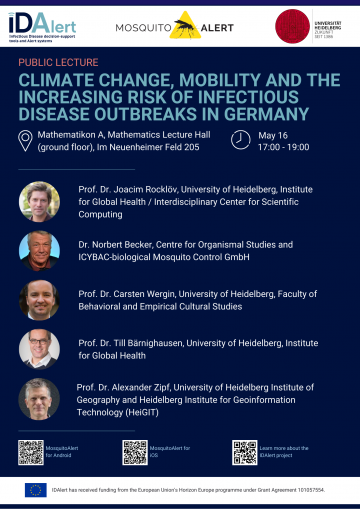
Upcoming Public Lecture May 16: Climate Change, Mobility, and the Increasing Risk of Infectious Disease Outbreaks in Germany
On Tuesday, May 16, visitors to the public lecture “Climate Change, Mobility, and the Increasing Risk of Infectious Disease Outbreaks in Germany” will be treated to insights from five experts currently pioneering research into one of the greatest threats to … Read More
![Figure 1. Total carbon fluxes related to LULCC in Baden-Württemberg between March 2018 and October 2019 (LaVerDi, OSMlanduse+), and March 2018 and March 2020 (OSMlanduse, OSMlanduse cleaned). The upper plot shows the relative difference of carbon fluxes [%] with respect to LULC transition and carbon flux attribution method. The carbon fluxes of method 1 are set to 0. The lower plot shows the total absolute carbon fluxes [Mg C] calculated with carbon flux attribution method 1 with respect to LULC transition and LULCC method.](https://heigit.org/wp-content/uploads/2023/05/ed501d68-7952-4263-a23e-a5f8a81fa7a4-360x409.png)
New Paper: Carbon Fluxes Related to Land Use and Land Cover Change in Baden-Württemberg
Featured Image: Figure 1. Total carbon fluxes related to LULCC in Baden-Württemberg between March 2018 and October 2019 (LaVerDi, OSMlanduse+), and March 2018 and March 2020 (OSMlanduse, OSMlanduse cleaned). The upper plot shows the relative difference of carbon fluxes [%] … Read More
Student Assistant (m/f/d) to Support the Deep Learning Data/Model Preparations
Our team is currently looking for: Student Assistant (m/f/d) to Support the Deep Learning Data/Model Preparations Your tasks will mainly be situated in supporting the design and development of deep learning systems. Tasks would include data preparation for computer vision … Read More
Mapathon on Permafrost Mapping May 8
HeiGIT will host a mapathon on mapping permafrost as part of the UndercoverEisAgents project on May 8 at 6 p.m. in the Mathematikon, INF 205 (IWR). As the climate warms, permafrost is thawing around the world. As a result, … Read More
Private Vehicles Greenhouse Gas Emission Estimation at Street Level for Berlin Based on Open Data
Since the transportation sector is one of the major greenhouse gas (GHG) emitters that has not seen significant emission reductions in the last decades, it requires special attention from policymakers. However, estimations of traffic emissions often rely on huge amounts … Read More
Assessing Completeness of OpenStreetMap Building Footprints Using MapSwipe
Natural hazards threaten millions of people all over the world. To address this risk, exposure and vulnerability models with high resolution data are essential. However, in many areas of the world, exposure models are rather coarse and are aggregated over … Read More
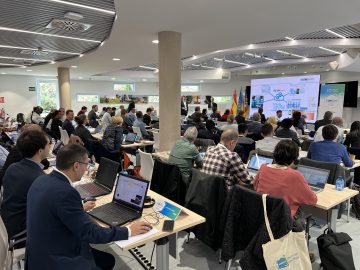
HeiGIT’s contribution to the 2nd UN Maps Conference
The United Nations Maps program, created in 2019, held its 2nd UN Maps Conference, this time in Valencia, Spain. Prof. Alexander Zipf of HeiGIT and the GIScience Research Group at Heidelberg University and Benjamin Herfort of HeiGIT attended the conference … Read More
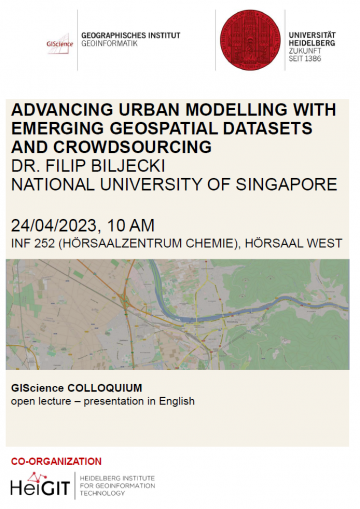
Upcoming GIScience Colloquium: Advancing urban modelling with emerging geospatial datasets and crowdsourcing
HeiGIT is proud to be co-organizing the upcoming GIScience colloquium, “Advancing urban modelling with emerging geospatial datasets and crowdsourcing” by Dr. Filip Biljecki of the National University of Singapore The colloquium will take place in the Hörsaalzentrum Chemie, Hörsaal West, INF … Read More
Launch: A New Online Mapping Application Helps UndercoverEisAgenten on the Trail of Permafrost
The UndercoverEisAgenten team have developed a new online mapping application to monitor permafrost thaw. From now on, interested citizen scientists can directly contribute online to collect reliable and up-to-date data on the thawing of Arctic permafrost landscapes- and thus improve … Read More
